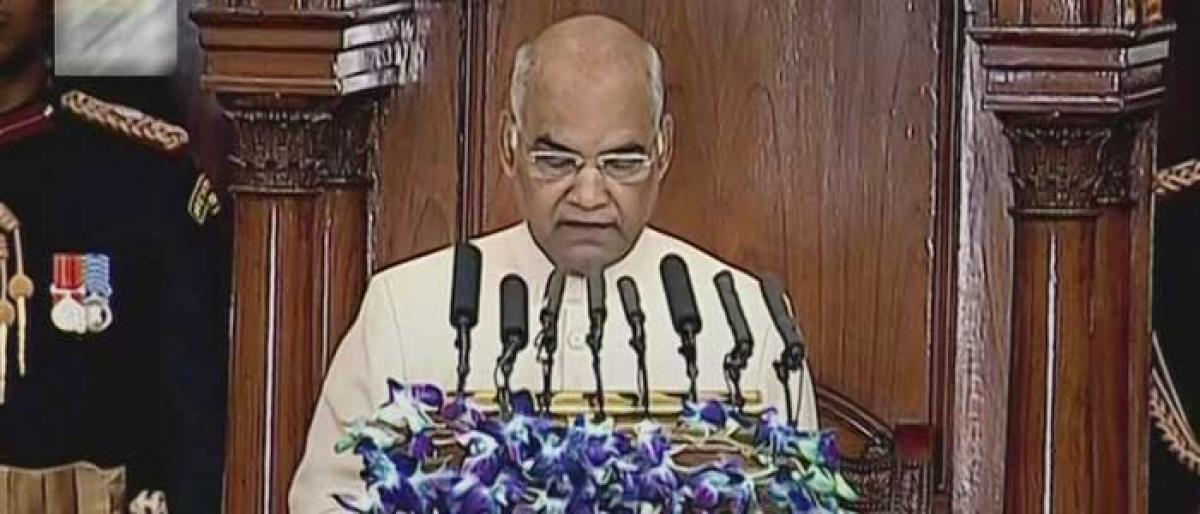Live
- Jaipur Open 2024: Baisoya makes a grand comeback to clinch title in marathon playoff against Rashid Khan
- Jamaat-e-Islami Hind President asks cadre to reach out to larger society beyond community
- Why PM mum on Caste Census, removing 50 pc quota limit: Rahul Gandhi
- Barrackpore Municipality Vice-Chairman found dead at home, suicide note suggests blackmail
- Selection trials announced for 20th Asian Senior Women's Handball Championship
- Women’s Asian Champions Trophy: India register 3-0 win over Olympic medallist China in Rajgir
- Sr Men's National Hockey: Odisha overcomes Haryana to secure maiden title
- Even Trinamool leaders not safe in Bengal: BJP
- K’taka: Police complaint lodged against petitioner in MUDA case
- Andhra college student jumps to death from hostel building after petty spat
Just In

President Ram Nath Kovind on Monday backed the Modi government’s idea of holding simultaneous elections for the Lok Sabha and state assemblies, and said frequent polls impose a huge burden on human resources and impede development due to promulgation of the model code of conduct.
New Delhi: President Ram Nath Kovind on Monday backed the Modi government’s idea of holding simultaneous elections for the Lok Sabha and state assemblies, and said frequent polls impose a huge burden on human resources and impede development due to promulgation of the model code of conduct.
“Therefore, a sustained debate is required on the subject of simultaneous elections and all political parties need to arrive at a consensus on this issue,” Kovind said in his address to the joint sitting of the two houses of Parliament on the first day of the budget session.
Indian has discussed ‘one nation one election’ idea for many years, starting with a Law Commission suggestion in 1999. A 2015 report by Parliament’s standing committee too suggested holding simultaneous election to save public money and end policy paralysis because of the impact of the model code of conduct.
It pegged the cost of holding elections for Lok Sabha and state assemblies at Rs 4500 crore. Prime Minister Narendra Modi too is a supporter of this idea. “Conducting the election after every 4-6 months in different states is very hectic and costly. There needs to be a wider debate on conducting the election at one time throughout the country,” the PM had said during an event to mark National Law Day in November last year.
The President’s Monday advice to political parties will further add to speculation about the government exploring options for an early vote to achieve the ‘one nation one election’ target in about a dozen states, if not all. In his customary speech, the President also listed a raft of schemes by the Modi government and aimed at the welfare of women and poor – two constituencies that the BJP has tried to cultivate after storming to power in 2014.
“Guided by this fundamental spirit of the Constitution and committed to the welfare of weaker sections, my government is working towards strengthening social justice and economic democracy and to usher ease of living for the common man,” Kovind said.
He referred to free cooking gas for BPL families, increased banking coverage, construction of toilets, girl child education programme, increased bank credit to young entrepreneurs and other such initiatives.
The President listed out in detail the works of the Modi government for farmers – a set of population that is under stress on account of declining profit –suggesting that Centre’s policies were not only to remove their hardships but also reduce their expenditure on farming.
“My government is committed to doubling of farmers’ income by 2022,” Kovind said. He also made a strong case for passage of the triple talaq bill, saying that for decades the “dignity of Muslim women has remained captive to political cost-benefit”.
The government tabled the bill in the winter session and was passed in the Lok Sabha. But it got stuck in the Rajya Sabha for want of number for passage. The Modi government, Kovind said, is committed to “empowerment and not appeasement” of minorities, and listed out examples such as allowing 45-plus women to perform Haj pilgrimage without a male companion.
Kovind said the upliftment and dignity of weaker and deprived sections of society was the government’s priority and it was sensitive towards the aspirations of every section of society. He cited a Constitution Amendment Bill to provide Constitutional Status to the National Commission for Backward Classes and a Commission to examine the sub-categorisation of backward classes as examples.

© 2024 Hyderabad Media House Limited/The Hans India. All rights reserved. Powered by hocalwire.com







